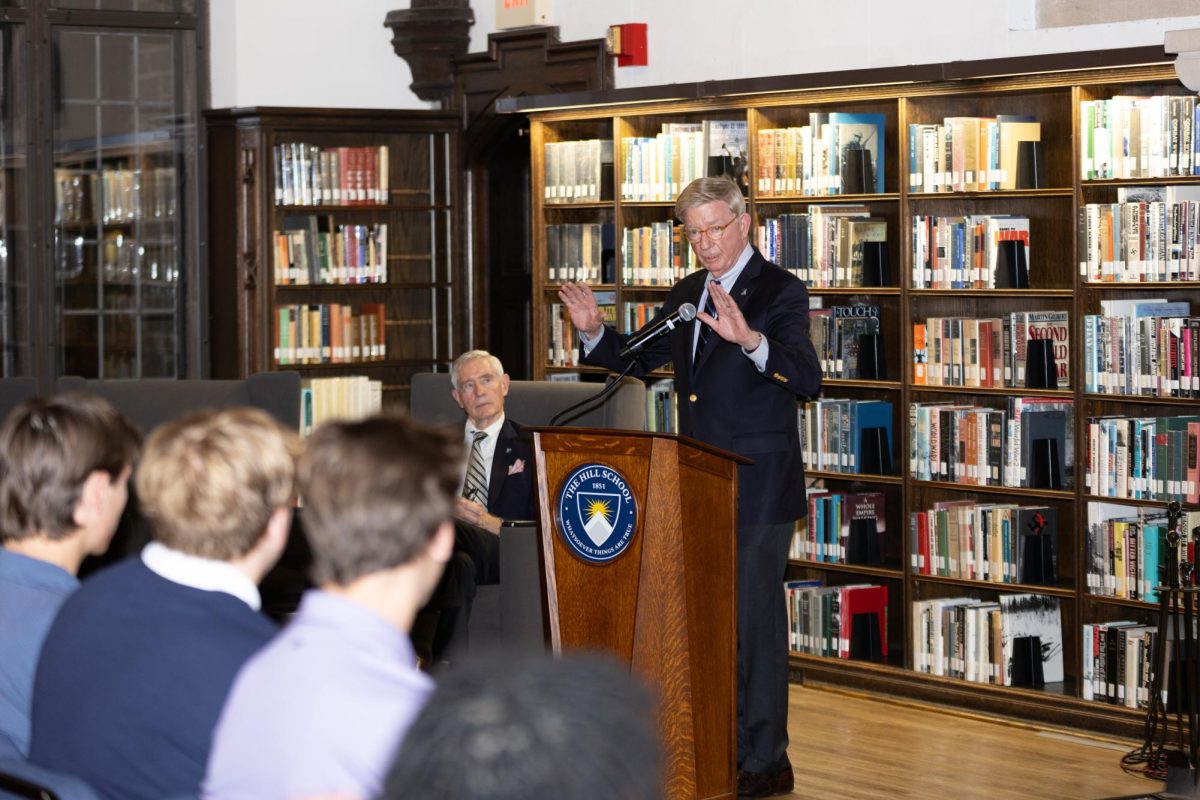George Will, renowned columnist in the Washington Post, spoke at Hill on Oct. 24 to aid students in navigating the election. Will delivered a thought-provoking and insightful speech espousing traditional conservatism, calling for a limited relationship between the U.S. economy and government involvement. About 200 people, mostly comprised economics, United States history and journalism students, attended the event.
Heavily involved in the process of inviting George Will was Kevin Tkachuk, chair of the history and social sciences department. Last spring, the history department sat down to discuss possible guest speakers for the upcoming school year. After extended consideration and discussions between them, they settled on George Will as they believed his breadth of knowledge would benefit students in various classes, especially concerning the upcoming presidential election.
Intertwined with various jokes and funny moments, many students believed George Will’s speech was both engaging and intriguing. However, some believed that while Will outlined the existing problems with the government and their power, he did not provide viable solutions that directly applied to students.
Shane Duo ’26 felt that George Will “stood neutral from both parties and emphasized underrepresented aspects of American politics.”
“Despite this, I felt that some of his points felt unfinished and I would’ve liked to hear more analysis and evidence,” Duo said.
Duo continued to claim that Will’s speech helped him realize the range and depth of issues that are largely ignored in standard political discourse. Will’s speech encourages people to explore and discuss those ideas to understand how the politics of the government came to be.
Similarly, Cayden Cubbin ’25 believed that Will “was generally formal in his arguments but did go on a few unreasonable tangents.” Though finding the talk at times hard follow, Cubbin expressed interest in seeing more concrete policy proposals.
“He provided a lot of problems and not very many solutions to them,” Cubbin said. “He was interesting to see and an entertaining speaker but ultimately left some to be desired with his arguments.”
In terms of the content, history and social science instructor Nick Malinak thought that Will’s speech gave essential context for the 2024 presidential election.
“It was useful for students to see that conservatism in the Republican Party used to be a lot more, especially prior to Donald Trump, where the top issues were really smaller governments, the debt, the taxation, with a strong like emphasis on foreign intervention in the rest of the world,” Malinak said.
While Will’s libertarian beliefs of balanced budgets and free markets may hold less sway in today’s Republican Party, Malinak said that Will’s presentation of his ideas were appropriately challenging for AP government and AP United States history classes, engaging them with crucial contemporary debates. According to Malinak, the prior election cycle put forward “ideas where we’re not talking about the fiscal meaning, the government spending ideas, and in part because neither candidate wants to talk about them.”
“But in a year from now when we’re trying to deal with Trump’s tax cuts, those will be big parts of the discussion,” Malinak said. “And so, I think they will come back into it a little bit more.”
While Will’s alternative perspective invited listeners to think about new issues that might not have crossed their mind before. Will’s visit and speech made a profound impact on Hill students not only on how to approach the election but also the power and responsibilities of the government.
“It was an incredible opportunity to hear his speech, and it revealed the depth and complexity of issues often overlooked in political discourse, challenging us to consider perspectives that transcend partisan divides,” Duo said.
























